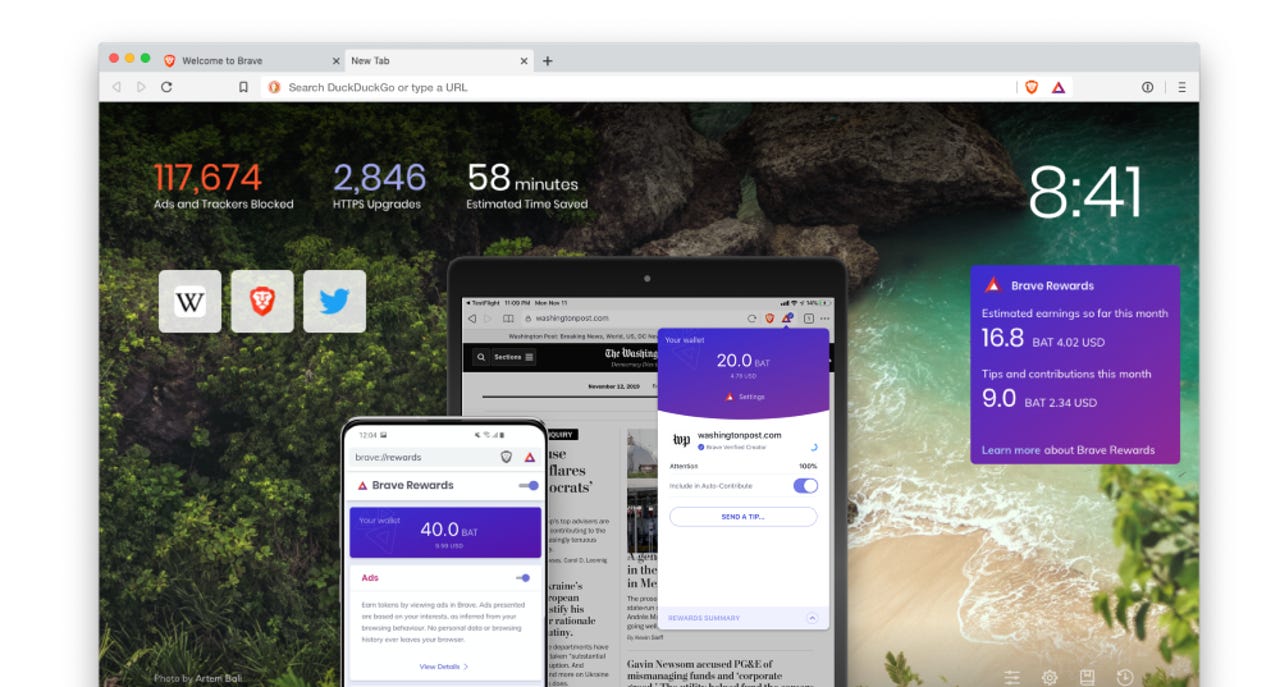Brave browser reaches v1.0, its first stable version


Today, the team behind the Brave browser announced the release of v1.0, the browser's first official stable release.
Developed from the ground up to be a privacy-first alternative to modern-day browsers, Brave 1.0 comes with many features not present in any other competitor's software. This includes:
Brave Ads
Brave blocks all ads by default, and instead uses its own private ad platform, designed to work right inside the browser, and with a focus on preserving users' privacy.
The Brave team says this ad network was designed with privacy in mind, and that no user data is sent back to any remote server. All the ad matching operations happen directly on the users' devices.
Furthermore, this new ad platform also uses a new blockchain-based advertising model that rewards users with Basic Attention Tokens (BAT) for every ad they view.
Users can keep the BAT they earn in a wallet app built into the browser, convert it to other cryptocurrency or fiat currency, or they can donate it to the websites they like, via the Brave Rewards program (see below).
Brave says that 70% of this ad network's revenue goes back to its users, while the company keeps 30%.
Brave Rewards
Brave Rewards is probably the most interesting feature added to any of web browser today. The Rewards program allows users to donate some of the BAT tokens they make by viewing Brave ads to the websites they like the most.
They can choose to sent BAT to any website they like, or the websites they frequent the most -- based on stats provided by Brave itself, based on the user's browsing history.
Brave says that more than 300,000 websites have verified profiles through which they collect BAT donations, including some of today's biggest names, such as The Washington Post, The Guardian, Wikipedia, creators on YouTube, Twitch, Twitter, GitHub and more.
More on the Brave Rewards program can be found in this documentation page, here.
Brave Shields
Brave 1.0 also comes with a built-in ad blocker, anti-tracking, and anti-fingerprinting features that block online advertisers, analytics, and social media companies from bombarding users with ads and tracking users as they move across websites.
This feature is getting constant improvements, with the latest update arriving last week.
The Brave team says that since it rolled out Brave Shields, the biggest benefit has been an improved performance. For example, the Brave team says websites load to up to three to six times faster than other browsers, resulting in significant memory and battery savings.
"Brave saves an average of 27 seconds per page load against Chrome on macOS and 22 seconds per page against Firefox, and Brave uses 58% less data than Chrome to load those same pages," the Brave team said in a pre-launch press release. "Brave also uses less memory than other browsers, with an improvement of 40% over Chrome and 47% over Firefox."
Brave 1.0 should roll out to active installations starting today. New users can also download and test it starting today. The browser is available for Windows, macOS, Linux, Android, and iOS.
The company said the browser had around 8.7 million monthly active users (MAU) during its beta testing phase, which, in perspective is around a tenth of Firefox' 100 million MAU, and a fraction of Chrome's 1+ billion MAU.
Under the hood, Brave 1.0 is built on the Chromium open-source browser engine, the same browser engine at the heart of Chrome, Opera, and Vivaldi.